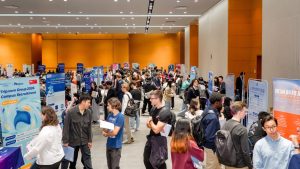Potential supervisors
School of Advanced Technology
Find out potential supervisors from Department of Communications and Networking.
Find out potential supervisors from Department of Computing.
Find out potential supervisors from Department of Electrical and Electronic Engineering.
Find out potential supervisors from Department of Intelligent Science.
Find out potential supervisors from Department of Mechatronics and Robotics.
XJTLU Entrepreneur College (Taicang)
Find out potential supervisors from School of AI and Advanced Computing.
Find out potential supervisors from School of Internet of Things.
Find out potential supervisors from School of Intelligent Manufacturing Ecosystem.
Find out potential supervisors from School of Robotics.
Find out potential supervisors from School of CHIPS.
Scholarships
The scholarship application is open only to those applying for full-time doctoral programmes.
1) Apply for a scholarship for a funded PhD project
One option is to apply for an existing PhD project that has received funds from the University or external funding bodies. The research topic and supervisory team for these projects have already been established.
There is no specific application deadline for a project, as it will remain open until the position is filled. The start date of a PhD programme is usually the first day of March, June, September, or December. You can visit the Postgraduate Research Scholarships Page for information about the specific PhD projects available or to contact potential supervisors to discuss funding opportunities.
2) Apply for PhD Merit-Based Scholarship
This type of scholarship is intended to support candidates with outstanding research programme. Prospective applicants seeking consideration for a merit-based scholarship may indicate their interest when submitting their application to the university’s doctoral programmes.
The school and University’s Postgraduate Research Scholarship Panel will conduct a comprehensive evaluation based on the applicants’ academic excellence, research potential, research experience, and achievements, and will recommend the most qualified candidates for the award.
More details can be found on the ‘How to Apply‘ page of the website.
The scholarship application is only open to those applying for a full-time doctoral programme.







Overview
The PhD in Computer Science and Software Engineering develops your understanding of the research process and your ability to analyse and constructively augment a particular research area. It provides you with experience in communicating research results in both written and oral forms and equips you with advanced knowledge and research skills relevant to both academia and industry.
We provide high-calibre, discipline-specific training that takes advantage of Xi’an Jiaotong-Liverpool University’s distinctive international features and vibrant research environment.
The programme, based at XJTLU, is a strategic research collaboration between XJTLU and the University of Liverpool. Upon successful completion of your programme you will receive a University of Liverpool-issued degree, which is recognised by China’s Ministry of Education.
Students enrolled in this programme are registered with XJTLU and the University of Liverpool as a doctoral student. You will carry out research on XJTLU premises under the guidance of a supervisory team.
You will be appointed a designated primary (local) supervisor at XJTLU who is a full-time member of academic staff. In addition, you will have a designated secondary supervisor based at the University of Liverpool.
Pursuing a full-time PhD typically involves three years of conducting research and one year of writing a thesis, supported by subject-specific and generic skills training and development. A full-time PhD student must submit a thesis within four years. A part-time PhD student must submit it in six years. As a registered full-time PhD student, you will have the opportunity to apply for a research visit to the University of Liverpool for up to six months.
XJTLU provides every registered PhD student with conference funds of up to 16,500 RMB over the course of study at XJTLU. The purpose of this fund is to support students’ academic experience, encourage the dissemination of research, and enhance XJTLU’s research profile nationally and internationally.
Why should I do my PhD in Computer Science and Software Engineering at XJTLU?
Research areas
The main research areas for the PhD in Computer Science and Software Engineering include the following: